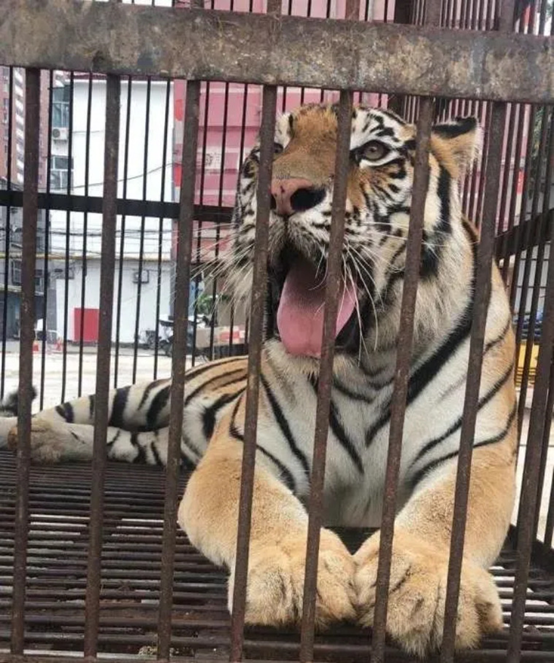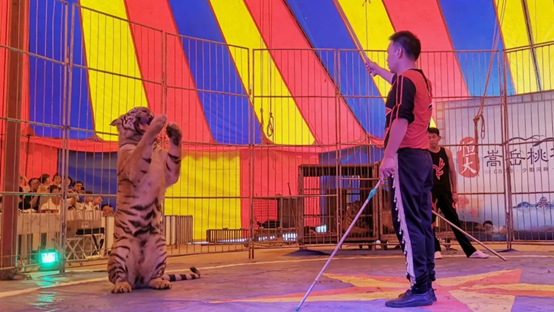On July 29, the topic of World Tiger Day appeared on the hot search. The intuitive figures awaken people: there are only about 4,000 wild tigers left in the world; the South China tiger, a subspecies unique to China, has been extinct in the wild; the well-known Siberian tiger inhabits only 27 in the mountain forests in the northeastern part of Jilin Province and Russia only…
According to the China Biodiversity Conservation and Green Development Foundation (CBCGDF)’s Endangered Species Special Fund’s desktop survey and supervision of temporary wildlife exhibitions across the country, since June, 36 temporary wildlife exhibitions have been discovered. More than half of the organizers are marketing activities organized by real estate companies. Among the 20 performances counted from June to July 20, 9 of them claimed to have tigers appearing, which accounted for a relatively high proportion.
The supervision results showed that during the mobile wildlife performance, many tigers were not kept in captivity in fixed places in the zoo. Instead, they were kept in iron cages and moved around in real estate marketing centers, shopping malls, stadiums, and streets, and other non-fixed, non-professional places. The environment is noisy and harsh, and animals are under stress, and safety accidents occur frequently. In addition, young tigers generally grow up with the tigress until they are 3 years old. In order to let the tigers start performing as soon as possible, the circus often forcibly separates the young tigers from the tigress when they have only grown for a few days.
The situation of performing tigers once again exposed the damage caused by the animals performance. A monkey beaten with a whip and a stick, a black bear with an iron chain on its neck, a liger with its claws removed, a killer whale long-term detained in a narrow pool... Forced to be separated from their mothers, living in an environment where they are not suitable, obeying human beings to make specified actions, performing animals will often have diarrhea, organ failure, disability, skin ulcers, mental depression, and even shortened life expectancy.
The good news is that animal entertainment has been banned in more and more countries. At present, more than 40 countries and regions around the world prohibit circuses from using wild animals for performances or restrict the types of wild animal tourism activities.
In February of this year, the Standing Committee of the National People’s Congress passed the "Decision of the Standing Committee of the National People's Congress on the comprehensive banning of illegal wildlife trade, elimination the habits of wild animal abuse, and effective protection of the people's lives, health and safety", it pointed out that the management of non-food use of wild animals should be strengthened. In the supporting local management requirements issued by Zhejiang Province, it is even more clarified that “It is forbidden to display terrestrial wildlife to the public in shopping malls, squares, roads and residential areas.” The "Beijing Regulations on the Protection and Administration of Wildlife" has also excluded "performance" from the non-edible use of the listed wild animals.
Hu Chunmei, head of the CBCGDF Endangered Species Special Fund’s Rescue Performance Animal Project, told the reporter, “Compared with the Wildlife Protection Law, the Decision narrows the scope of the non-edible use of wild animals and removes the ‘performance’ content, and requires strict approval and strict quarantine.”
In recent years, with the continuous improvement of public awareness, more and more people have begun to realize the pain and harm caused by animal entertainment to wild animals.
Non-governmental environmental protection forces are also taking action. For example, as early as 2013, CBCGDF initiated and undertook the "Save Performance Animals" project related to elephants, tigers, monkeys and other animals, aiming to strengthen the protection of animal welfare and crack down on the related industry chain of illegal animal breeding and profit, a total of more than 41 mobile animal performances were suspended. Not long ago, the CBCGDF volunteer stopped an animal show in Shijiazhuang, Hebei Province, and persuaded them to return home. The person in charge of the activity finally stated that they would cancel the lion and tiger performances.

(Photo credit: CBCGDF volunteer)

(Photo source: Internet)
Original Chinese article:
https://mp.weixin.qq.com/s/-_oBYQTS8Ryz-IDmiFCHRw
By / Liu Xiling (Volunteer) Modified / Niu Jingmei
https://www.paypal.me/CBCGDFChina
http://www.cbcgdf.org/English/ConfirmDonaTion/0.html


(Please indicate "I read CBCGDF" in the payment notes, thank you!)
